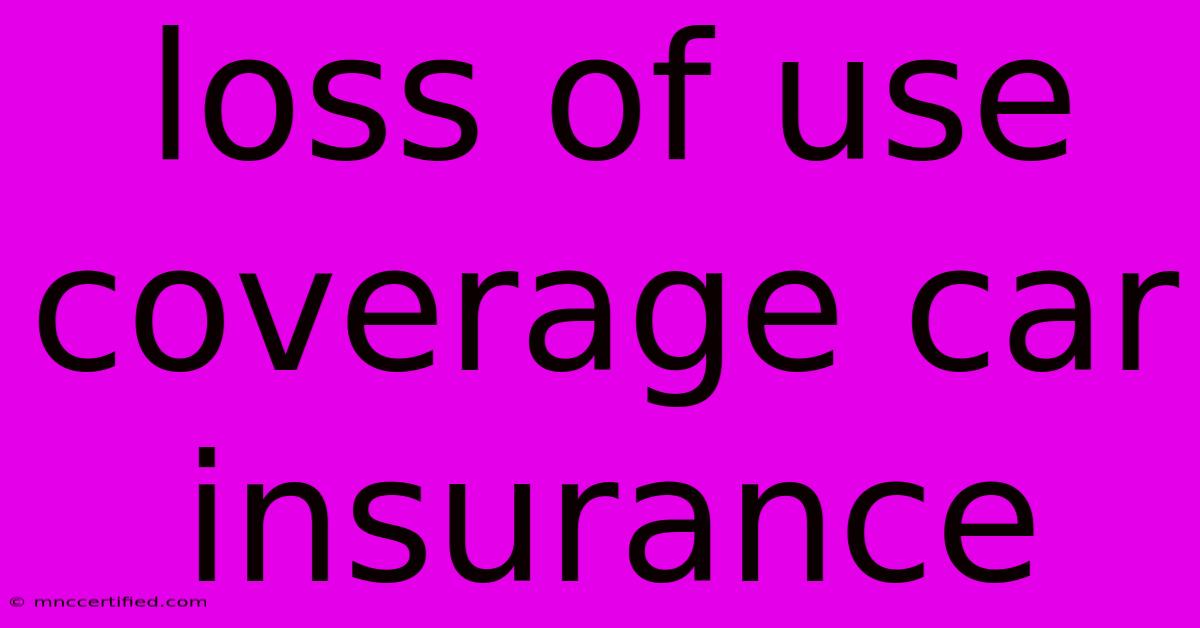Loss Of Use Coverage Car Insurance

Table of Contents
Loss of Use Coverage: Understanding Your Car Insurance Policy
Losing your car due to an accident or other covered incident can be incredibly disruptive. Beyond the cost of repairs, you face inconveniences like getting to work, running errands, and managing daily life. This is where Loss of Use (LOUC) coverage, also known as rental reimbursement or inconvenience coverage, steps in. This article will delve into the intricacies of Loss of Use coverage in your car insurance policy, helping you understand what it covers, what it doesn't, and how to maximize its benefits.
What is Loss of Use Coverage?
Loss of Use coverage is an optional add-on to your car insurance policy that compensates you for the financial burden of not having your vehicle while it's being repaired due to a covered incident, such as a collision or theft. This compensation typically takes the form of reimbursement for a rental car, public transportation, or even ride-sharing services. It's designed to bridge the gap in your daily routine caused by the unavailability of your vehicle.
Key Aspects of LOU Coverage:
- Not Standard Coverage: Unlike liability and collision coverage, Loss of Use is not standard in most car insurance policies. You must purchase it as an add-on.
- Limits and Duration: The policy will specify a daily or total limit on the amount you can claim. There's also a time limit, often capped at a certain number of days or until the repairs are completed, whichever comes first.
- Covered Incidents: The specific events covered under LOUC will depend on your policy. Generally, it covers damage resulting from accidents, theft, vandalism, or other incidents covered by your collision or comprehensive coverage.
- Deductible: Similar to other car insurance coverage, LOUC may have a deductible, which is the amount you'll pay out-of-pocket before the insurance company starts paying.
What Does Loss of Use Coverage Cover?
Typically, Loss of Use coverage covers the reasonable cost of:
- Rental Car: This is the most common use of LOUC. Your insurer will reimburse you for a reasonable rental car, up to the policy limits. They might have preferred rental agencies or specific vehicle class restrictions.
- Ride-Sharing Services (e.g., Uber, Lyft): Some policies may extend coverage to ride-sharing services as an alternative to rental cars.
- Public Transportation: In certain situations, reimbursement for public transportation might be considered.
What Doesn't Loss of Use Coverage Cover?
It's crucial to understand what is not typically covered under LOUC:
- Routine Maintenance: Damage caused by regular wear and tear or routine maintenance is not covered.
- Incidents Not Covered by Your Policy: If the damage to your car isn't covered by your collision or comprehensive coverage (e.g., damage from driving under the influence), LOUC won't apply.
- Loss of Income: LOUC does not compensate for lost wages or income due to the lack of transportation.
- Exceeding Policy Limits: Claims exceeding your policy's daily or total limit won't be fully reimbursed.
How to Maximize Your Loss of Use Coverage
To ensure you get the most out of your LOUC:
- Read Your Policy Carefully: Understand the specific terms, conditions, limits, and exclusions of your LOUC coverage.
- Keep Detailed Records: Maintain detailed records of all expenses related to your rental car, ride-sharing services, or public transportation. This includes receipts, dates, and mileage.
- File a Claim Promptly: Report the incident and file a claim with your insurer as soon as possible.
- Choose a Reputable Rental Agency: Select a reputable rental agency to ensure smooth processing of your reimbursement.
- Consider Increasing Your Coverage: If you frequently rely on your vehicle, consider increasing your LOUC limits to better protect yourself from financial setbacks.
Is Loss of Use Coverage Worth It?
Whether LOUC is worth it depends on your individual circumstances and risk tolerance. If you rely heavily on your vehicle for daily commutes, work, or other essential activities, the peace of mind offered by LOUC might be invaluable. Consider the potential inconvenience and costs associated with a vehicle being out of commission and weigh them against the premium for LOUC.
By understanding the nuances of Loss of Use coverage, you can make an informed decision about whether to include it in your car insurance policy and effectively utilize it in case of a covered incident. Always contact your insurance provider for specific details regarding your policy.

Thank you for visiting our website wich cover about Loss Of Use Coverage Car Insurance. We hope the information provided has been useful to you. Feel free to contact us if you have any questions or need further assistance. See you next time and dont miss to bookmark.
Featured Posts
-
Bluesky Down Users Flock To New Platform
Nov 15, 2024
-
La Bondad De Dios Acordes En Piano
Nov 15, 2024
-
Legal Battle Assos Sues Asos For Trademark Use
Nov 15, 2024
-
Eras Theme At Toronto Pearson Airport
Nov 15, 2024
-
Davina Mc Calls Partner Michael Douglas Biography
Nov 15, 2024